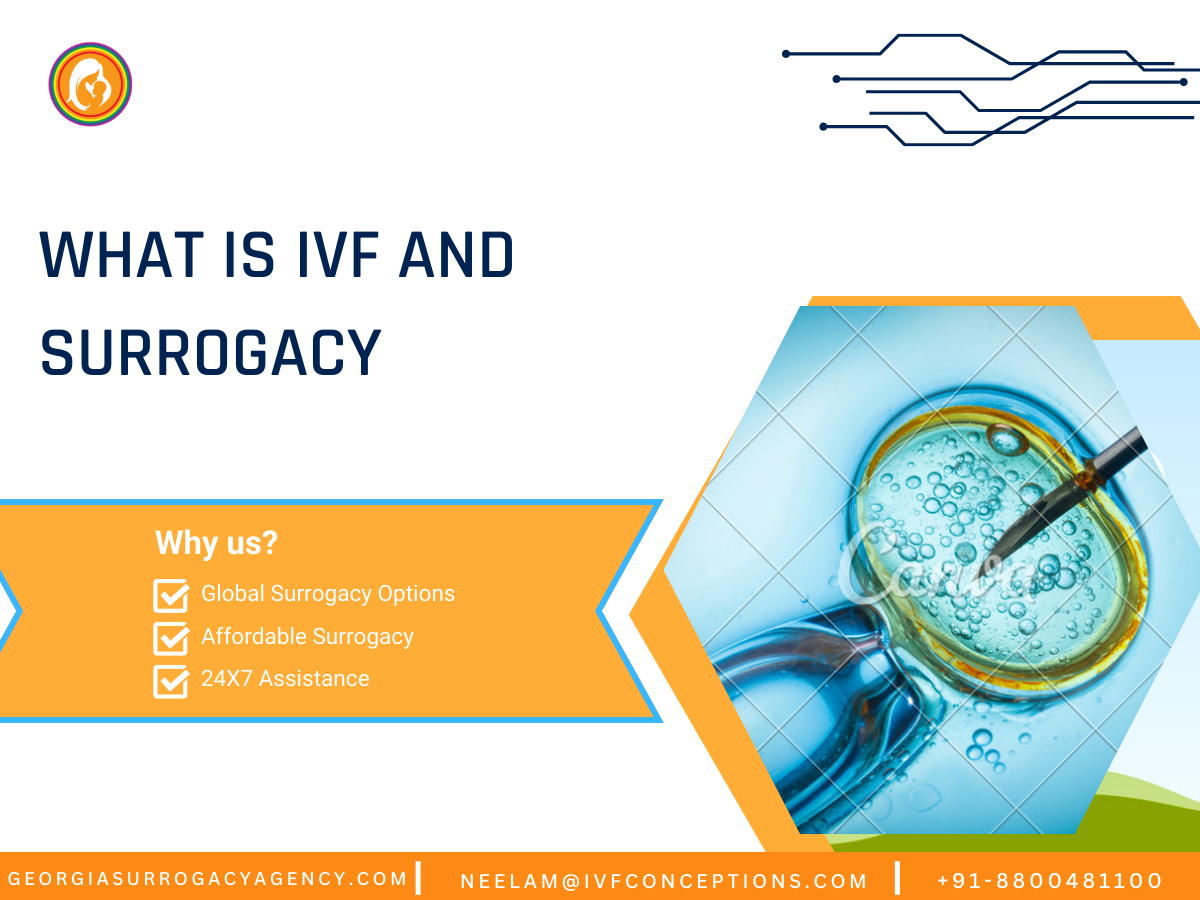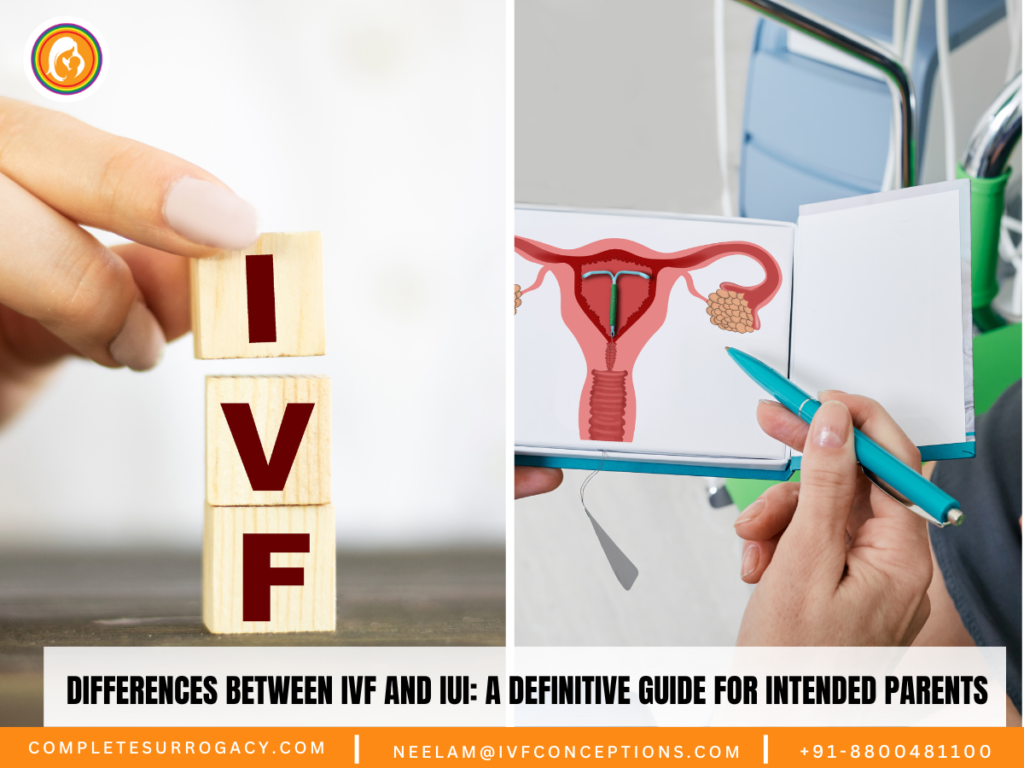What is IVF and Surrogacy: Exploring Paths to Parenthood

IVF (In Vitro Fertilization) and Surrogacy are two advanced fertility options that help individuals and couples overcome infertility to achieve parenthood. IVF is a medical procedure where an egg is fertilized with sperm in a lab, and the resulting embryo is transferred into a uterus. Surrogacy involves a woman (the surrogate) carrying a pregnancy on behalf of intended parents, often using IVF to implant the embryo. These methods are widely used by couples facing infertility, same-sex couples, and individuals unable to carry a pregnancy. With costs ranging from $12,000 to $25,000 for IVF and $45,000 to $180,000 for surrogacy, understanding the process, legal aspects, and success rates is crucial.
New advances in reproductive hWhat is Mitochondrial Donation IVF Treatmentealth are changing how people and couples look at fertility treatments. This brings new hope to those who are struggling to have a child.
About 1 in 8 couples face infertility. But, thanks to modern technology, there are many ways to start a family. IVF and surrogacy are helping single parents, LGBTQ+ individuals, and couples with complex fertility issues.
The world of fertility has changed a lot. New medical technologies are opening doors for those wanting to become parents. Whether it’s due to infertility, genetic issues, or personal reasons, there are now more options than ever before. Read on for a detailed breakdown of IVF and surrogacy, who needs them, and how they work.
Key Takeaways
- IVF and surrogacy provide alternative paths to parenthood
- Reproductive technology supports diverse family structures
- Modern fertility treatments offer hope for individuals facing conception challenges
- Approximately 12.5% of couples experience fertility issues
- Assisted reproductive technology continues to advance rapidly
📞 Get in Touch for a Free Surrogacy Consultation
📱 +91-8800481100 (WhatsApp | LINE | Viber)
📧 neelam@ivfconceptions.com
🌐 www.completesurrogacy.com
Additional guides:
What Is Surrogacy Meaning A Comprehensive Guide
How Does the Surrogacy Process Work?
Choosing the Best IVF Doctor: Expert Guide

Understanding Modern Fertility Treatments and Options
Reproductive assistance has changed how people and couples deal with infertility. Now, there are many new ways to help those trying to have a baby. These advanced medical technologies offer hope to many.
Today’s fertility treatments are much more advanced. They give people many ways to start a family. Fertility specialists use new methods to help with different challenges.
Types of Assisted Reproductive Technology
The main fertility treatments are:
- Intrauterine Insemination (IUI)
- In Vitro Fertilization (IVF)
- Intracytoplasmic Sperm Injection (ICSI)
- Embryo Genetic Testing
Traditional vs Advanced Fertility Methods
Older fertility treatments were simpler. Now, we use advanced technologies to help more people. These new methods aim to increase success rates.
| Traditional Method | Advanced Technique |
| Hormonal Treatments | Genetic Embryo Screening |
| Timed Intercourse | Precise Embryo Transfer |
Medical Considerations for Treatment Selection
Choosing the right fertility treatment is important. A reproductive specialist will help based on your age, medical history, and infertility type. These factors help decide the best treatment for you.
Success rates vary. For women under 35, IVF can lead to pregnancy rates up to 55%. This is a big improvement from older methods. Specialists now create treatment plans that fit each person’s needs.
Approximately 17.5% of adults globally experience infertility, highlighting the critical importance of advanced reproductive technologies.
Every fertility journey is different. Modern reproductive assistance offers hope with advanced medical help. It’s designed to tackle various reproductive challenges.
IVF and Surrogacy: Key Differences and Considerations
Both In Vitro Fertilization (IVF) and Surrogacy are reproductive options for individuals and couples facing infertility. However, they serve different purposes. Here’s a detailed comparison of IVF and Surrogacy, along with key considerations for intended parents.
When intended parents choose gestational surrogacy, the full process consists of doing IVF with the intended parents’ eggs and sperm/ or donor gametes if needed. Once embryos are created via IVF, they are transferred to a surrogate mother in the hope of implantation. SO, we can say that IVF surrogacy is an integral part of any surrogacy process. In the case of traditional surrogacy, IVF is not required as most semen insemination procedures are done.
IVF vs. Surrogacy: What’s the Difference?
| Aspect | IVF (In Vitro Fertilization) | Surrogacy |
| Definition | A fertility treatment where an egg is fertilized in a lab and transferred into a uterus. | A process where a surrogate carries and delivers a baby for intended parents. |
| Who Needs It? | Couples with infertility, women with tubal issues, advanced maternal age, unexplained infertility. | Intended parents unable to carry a pregnancy (e.g., same-sex male couples, women with medical conditions, single parents). |
| Procedure | Eggs are retrieved from the intended mother or donor, fertilized with sperm in a lab, and transferred into the uterus. | The surrogate undergoes an embryo transfer after IVF; she carries the baby but has no genetic relation in gestational surrogacy. |
| Success Rate | Depends on age and egg quality; 40-50% per cycle for women under 35. | Depends on embryo quality and surrogate health; varies between 50-70% per embryo transfer. |
| Timeframe | 4-6 weeks per cycle. | 12-18 months (includes matching, legal, and pregnancy). |
| Cost | $12,000 – $25,000 per cycle (without medications). | $45,000 – $180,000 (varies by country and agency). |
| Legal Aspects | No legal complexities; IVF is widely accepted worldwide. | Requires legal contracts to define parental rights (laws vary by country). |
| Genetic Connection | The baby is genetically related to the intended parents or donor. | In gestational surrogacy, the baby is genetically related to the intended parents. In traditional surrogacy, the surrogate is the biological mother. |
| Ethical Considerations | Ethical concerns about embryo selection, storage, and multiple pregnancies. | Ethical concerns about surrogate rights, compensation, and exploitation. |
Key Considerations When Choosing IVF or Surrogacy
1. Medical Factors
- IVF is ideal for women who can carry a pregnancy but struggle with conception.
- Surrogacy is necessary when carrying a pregnancy is medically unsafe or impossible.
2. Financial Costs
- IVF is significantly more affordable than surrogacy, but multiple cycles may be required.
- Surrogacy includes agency fees, legal fees, medical expenses, and surrogate compensation.
3. Legal and Ethical Aspects
- IVF is legally straightforward.
- Surrogacy laws vary globally—some countries ban it, while others have strict regulations.
4. Emotional and Psychological Readiness
- IVF can be emotionally taxing due to multiple cycles and potential failures.
- Surrogacy involves trusting another person to carry the pregnancy, requiring strong emotional support.

The Journey Through Gestational Surrogacy
Gestational surrogacy is a way for people to become parents when they can’t have a baby on their own. It’s a special fertility treatment that gives hope to those facing fertility issues.
This journey starts with a surrogate mother carrying a baby that isn’t genetically hers. The baby is made through in vitro fertilization (IVF). This uses the genetic material from the intended parents or donors.
- Selecting a Surrogate Carrier
Finding the right surrogate is a big deal. It needs careful screening and clear criteria. Here are some key things to look for:
- Age range between 21-43 years
- Previous successful full-term pregnancy
- A maximum of five prior pregnancies
- Body Mass Index (BMI) of 32 or below
- Residency in a surrogacy-friendly state
- Legal and Medical Requirements
Choosing a surrogate means doing a lot of checks:
| Screening Stage | Key Components |
| Medical Screening | Complete health assessment and fertility evaluation |
| Legal Screening | Background checks for surrogate and household members |
| Financial Verification | Proof of financial stability |
- The Embryo Transfer Process
Embryo transfer is a key part of gestational surrogacy. About 95% of surrogacy cases in the United States use this method. It starts with making embryos through IVF. Then, the best embryos are chosen and put into the surrogate’s uterus.
Success rates for gestational surrogacy are much higher than other fertility treatments. A 2016 study in Fertility and Sterility showed better success rates. This gives hope to those trying to become parents.
Understanding the Core Differences
IVF and surrogacy differ in medical procedures, biological connections, and strategies:
- IVF focuses on fertilizing eggs outside the body
- Surrogacy involves another woman carrying the pregnancy
- Success rates vary between the two methods
Comparative Overview of IVF and Surrogacy
| Aspect | IVF | Surrogacy |
| Procedure | Egg fertilization in laboratory | Embryo transfer to surrogate’s uterus |
| Success Rate | 40% for women under 35 | 50-60% per cycle |
| Average Cost | $12,000-$15,000 per cycle | $90,000-$150,000 total |
IVF is a fertility treatment where eggs are fertilized outside the body. Then, they are transferred back into the uterus. Surrogacy adds a new layer by using a dedicated carrier to help achieve parenthood.
Exploring Family Building Options
Both IVF and surrogacy have their benefits for those facing reproductive challenges. An in vitro fertilization clinic can offer personalized advice. They help you choose the best option for your needs and situation.
Understanding Third-Party Reproduction
Third-party reproduction is a new way to help people who can’t have kids the usual way. It uses donated eggs, sperm, or embryos to create families. This method is for those who face fertility challenges.
Since 1984, reproductive technology has changed a lot. Now, third-party reproduction offers many solutions for different fertility needs.
Egg Donation Process
Egg donation is a medical process that helps people who have kids. The best egg donors are usually:
- Between 21-34 years old
- Physically and mentally healthy
- Ready for detailed medical checks
The egg donation process includes strict medical checks. This is to make sure the chances of having a baby are high. Donors go through:
- Genetic tests
- Tests for diseases
- Psychological checks
Sperm Donation Options
Sperm donation is another important part of reproductive help. Donors are picked based on their health and genetic tests. This ensures the best genetic material.
People can choose from:
- Known donors – people they know
- Anonymous sperm bank donors – donors who are professionally checked
Genetic and Medical Screening
Genetic and medical screening are key to safe third-party reproduction. These tests help find any genetic risks. They protect both donors and the future children.
Screening follows strict rules from the American Society for Reproductive Medicine. This ensures top reproductive health standards.
These new reproductive technologies open up more ways for people to start families. They use egg donation, sperm donation, and other new methods.

Cost of IVF Surrogacy Process
The cost of IVF and surrogacy varies based on location, medical needs, legal requirements, and surrogate compensation. Below is a detailed breakdown of IVF and surrogacy costs in the U.S. and internationally.
IVF Cost Breakdown (USA & International)
| Expense | Estimated Cost in the USA | Estimated Cost Internationally (Europe, Asia, Latin America) |
| Initial Consultation & Testing | $500 – $1,500 | $200 – $1,000 |
| Ovarian Stimulation Medications | $3,000 – $7,000 | $1,000 – $3,000 |
| Egg Retrieval & Fertilization | $7,000 – $12,000 | $3,000 – $7,000 |
| Embryo Culture & Genetic Testing (PGT-A) | $3,000 – $5,000 | $1,500 – $4,000 |
| Embryo Transfer | $3,000 – $5,000 | $1,500 – $4,000 |
| Frozen Embryo Transfer (if needed) | $3,000 – $5,000 | $1,500 – $3,500 |
| IVF Cycle Total (without meds) | $12,000 – $25,000 | $5,000 – $15,000 |
| Additional Cycles (if needed) | $10,000 – $20,000 per cycle | $4,000 – $10,000 per cycle |
🔹 Total IVF cost in the USA: $15,000 – $30,000 per cycle (with meds)
🔹 Total IVF cost internationally: $6,000 – $18,000 per cycle (with meds)

Surrogacy Cost Breakdown (USA & International)
| Expense | Estimated Cost in the USA | Estimated Cost Internationally (Mexico, Ukraine, Georgia, Colombia, etc.) |
| Agency Fees | $15,000 – $30,000 | $5,000 – $15,000 |
| Surrogate Compensation | $40,000 – $60,000 | $10,000 – $25,000 |
| Legal Fees & Contracts | $10,000 – $15,000 | $3,000 – $7,000 |
| Medical & IVF Expenses | $25,000 – $40,000 | $10,000 – $25,000 |
| Surrogate Insurance & Travel | $5,000 – $15,000 | $3,000 – $8,000 |
| Additional Pregnancy Care Costs | $5,000 – $10,000 | $2,000 – $5,000 |
| Unexpected Costs (C-Section, NICU, Complications, Twins, etc.) | $10,000 – $25,000 | $5,000 – $15,000 |
| Total Surrogacy Cost | $120,000 – $180,000 | $45,000 – $100,000 |
🔹 Total cost of surrogacy in the USA: $120,000 – $180,000
🔹 Total cost of surrogacy internationally: $45,000 – $100,000
Key Takeaways on IVF & Surrogacy Costs
- IVF is more affordable but may require multiple cycles, increasing costs.
- Surrogacy in the USA is the most expensive due to surrogate compensation and legal protections.
- International surrogacy is more affordable, but legal risks vary by country.
- Guaranteed surrogacy programs (with unlimited IVF attempts) may cost $150,000 – $200,000 in the USA and $60,000 – $120,000 internationally.
Breaking Down the Costs of IVF Egg Donor Surrogacy
IVF clinic procedures have many costs. Parents-to-be need to plan for a big financial investment. This can be $100,000 to $250,000.
| Expense Category | Cost Range |
| Surrogacy Agency Fees | $35,000 – $55,000 |
| Surrogate Compensation | $35,000 – $95,000 |
| Legal Fees | $10,000 – $25,000 |
| IVF Cycle | $25,000 – $35,000 |
| Egg Donation | $30,000 – $40,000 |
Why Gestational Surrogacy Costs More Than Traditional IVF
Gestational surrogacy is more expensive than regular IVF. It includes:
- Many medical screenings
- Legal agreements
- Surrogate pay
- Special reproductive technology
Some employers help with fertility costs. Companies like Starbucks, Walmart, and Intel offer up to $40,000 for fertility treatments.
Careful financial planning is vital for your family-building journey.
Conclusion
Reproductive health and family building have changed a lot. Now, IVF and surrogacy help people who can’t have kids naturally. These methods turn dreams of being parents into real life.
About 1 in 8 couples face fertility issues. These advanced medical ways offer real solutions. They help those who can’t get pregnant on their own.
There are many ways to build a family, depending on your situation. IVF works well, especially for women under 35. They have a 40% chance of success per cycle.
Both IVF and surrogacy offer hopeful paths to parenthood, but they cater to different needs. If a woman can safely carry a pregnancy, IVF is the first option. If carrying a baby isn’t possible, surrogacy becomes the best alternative. Understanding costs, legal aspects, and medical implications will help intended parents make an informed decision.
We are leading International Surrogacy Industry Experts with more than 15 years of global experience and expertise. Get in touch with us about affordable, reliable, and legal surrogacy options.
📞 Get in Touch for a Free Surrogacy Consultation
📱 +91-8800481100 (WhatsApp | LINE | Viber)
📧 neelam@ivfconceptions.com
🌐 www.completesurrogacy.com
💫 Why Intended Parents Choose Complete Surrogacy for a Safe, Smooth & Successful Surrogacy Journey:
- 🌍 Access to multiple surrogacy destinations with 15+ years of international experience
- 🏥 Partnerships with top-tier fertility clinics and agencies, backed by references from past clients
- 👩🦱 Diverse egg donor options: Asian, Caucasian, African, Oriental, and more
- 💸 Transparent and affordable pricing—direct payments with no extra agency fees
- 🔒 No hidden costs—all charges are agreed upon upfront
- 🤝 Dedicated case manager for personalized support
- 📲 Fast, honest, and clear communication throughout

FAQs for the IVF Surrogacy process
What is the difference between IVF and surrogacy?
IVF is when eggs and sperm are mixed in a lab. Surrogacy is when another woman carries a baby for you. In surrogacy, the baby isn’t related to the carrier, as the embryo is made in a lab and then put in her uterus.
Who might benefit from surrogacy or IVF?
These options help many people. This includes couples who can’t get pregnant, same-sex couples, and those with health issues. They offer hope to those who can’t conceive naturally.
How do I choose between IVF and surrogacy?
Your choice depends on your health, what you prefer, and your fertility challenges. Talking to a fertility expert is key. You’ll need to think about your medical history, age, and any health conditions.
What are the typical costs associated with IVF and surrogacy?
Costs vary a lot, from $30,000 to $150,000. Surrogacy is often pricier because of more medical steps and legal needs. The cost depends on medical bills, agency fees, legal contracts, and how many times you might need to try.
What medical screenings are required for surrogacy?
Surrogates need many tests. These include checks on their reproductive health, genetic tests, and mental health checks. This ensures they’re ready physically and mentally for the journey.
How long does the entire surrogacy or IVF process take?
Times vary. IVF can take 4-6 weeks per try. Surrogacy can take 12-18 months. This includes finding a surrogate, medical prep, legal steps, embryo transfer, and waiting to confirm pregnancy.
What legal considerations are important in surrogacy?
Legal agreements are key. They cover rights, money, medical choices, and what-ifs. Each state has its own laws, so a good lawyer is essential to protect everyone’s rights.
Are there emotional support resources available during this process?
Yes, many clinics offer counseling and support groups. These help with the emotional side of fertility treatments. They provide advice and ways to cope during the journey.
What are the success rates for IVF and surrogacy?
Success rates depend on age, health, and fertility issues. IVF works for 20-50% of women under 35. Surrogacy can be more successful because of the carrier’s fertility.
Can single individuals pursue surrogacy or IVF?
Absolutely. Single people can build families through these options. They can use donor eggs or sperm, or work with a surrogate. Experienced fertility experts can guide them.
Source Links
- https://www.fertilitysourcecompanies.com/blog/exploring-alternative-paths-to-parenthood-egg-donation-and-surrogacy – Exploring Alternative Paths to Parenthood: Egg Donation and Surrogacy – Fertility Source Companies
- https://www.reproductivefacts.org/news-and-publications/fact-sheets-and-infographics/third-party-reproduction-booklet/ – Third-Party Reproduction patient education booklet
- https://crh.ucsf.edu/fertility-treatment/third-party-reproduction-overview – Third Party Reproduction | UCSF Center for Reproductive Health
- https://jcrm.org/third-party-reproduction-egg-donation-vs-surrogacy/ – Third-Party Reproduction: Egg Donation vs. Surrogacy – Practice News

Author Bio: Neelam Chhagani is an International Surrogacy Expert with 15 years of experience in the fertility and surrogacy domain. As the founder of IVF Conceptions and Complete Surrogacy, she has guided over 4,000 intended parents worldwide on their surrogacy journey to parenthood. Recognized as a trusted authority, she specializes in holistic infertility solutions and third-party reproduction consulting.
Holding an MA in Counselling Psychology and a PGD in Mental Health, Neelam is a proud member of the European Fertility Society (EFS) and the European Society of Human Reproduction and Embryology (ESHRE). She is also a leading surrogacy blogger, providing valuable insights into ethical and practical surrogacy solutions.
Since 2010, committed to supporting ALL family types, Neelam has been passionate about helping intended parents grow their families with compassion, integrity, and a focus on secure and affordable surrogacy options Globally.
Learn more about Neelam:
https://www.ivfconceptions.com/neelam-chhagani-surrogacy-consultant/
https://www.linkedin.com/in/neelam-chhagani-92892229/
https://www.quora.com/profile/Neelam-Chhagani














I was introduced to Neelam by a friend who worked with Neelam for surrogacy. Neelam is absolutely wonderful. I am a single male and the journey to fatherhood is not that easy. Neelam connected me to a program ideal for my circumstances. She was with me throughout the pregnancy providing advice and guidance along the way. I am so grateful I found her and am thrilled today that I have a beautiful daughter. I highly recommend Neelam to anyone who is on a journey to become a parent. Having a child has changed my world for the better. I wish others success with their own journey and recommend you connect with Neelam to find a path that is best for you.
SA (USA)